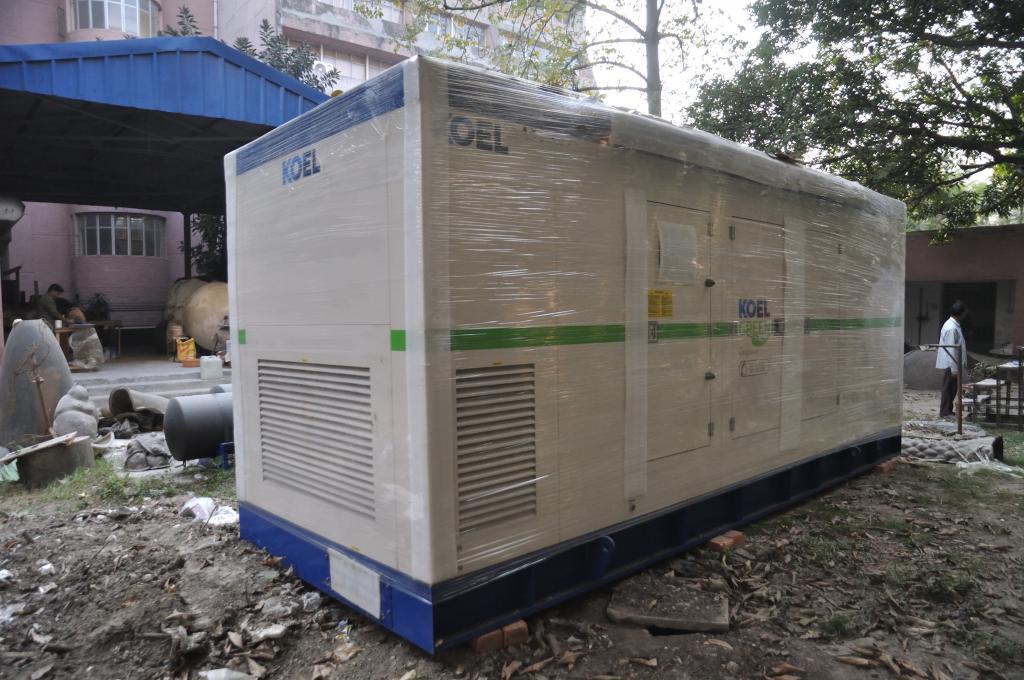

The NGT directed Uttar Pradesh Pollution Control Board to take remedial action to ensure compliance of air quality and noise standards from operation of diesel gensets



The National Green Tribunal (NGT) recently directed the Uttar Pradesh Pollution Control Board to take remedial action to ensure compliance of air-quality and noise norms from the operation of diesel generators (DG).
It asked for suitable safeguards for the operation of DG sets in an order dated October 18, 2021. The order was passed following a petition against violation of air quality norms by diesel generators by the Management Board of the Windsor Park Residents Welfare Association (WPRWA) in Ghaziabad, Uttar Pradesh.
The Windsor Park society has 12 towers — each with 10-23 floors. The chimneys of all the DG sets, however, do not extend above the roof heights of the residential towers but end right above the DG sets. They, therefore, release all exhaust emissions at the ground level.
This has been causing discomfort to the residents, particularly those living on the lower floors of the towers, for several years. Repeated complaints to the management board of WPRWA have been in vain.
DG sets have been a cause of concern: Its operation is banned under Graded Response Action Plan (GRAP) notified by the central government. The National Clean Air Programme (NCAP) of the Government of India also envisages replacement of DG sets by gas-operated generators and retrofitting of existing generators.
DG sets contribute to air pollution: A CSE assessment
An independent study titled Feasibility assessment: Replacing diesel-based with gas-based generators by Delhi-based think tank Centre for Science and Environment (CSE) revealed DG sets significantly contributed to air pollution in the area.
The study was carried out for Faridabad Industrial area, which includes Faridabad and Ballabgarh and houses approximately 1000 air-polluting industries.
While the use of coal and other fuels in boilers and thermopacks is expected to be major source of air pollution, it was surprising that industries used more than 1,000 DG sets in the area.
These DG sets of 378 MW capacity consume 1.4 lakh tonnes of diesel annually. This accounts for 60-70 per cent of total annual liquid fuel consumption in the region. The burning of fuel contributes 50 per cent of particulate matter and sulphur dioxide load in the air, according to CSE’s estimates.
The report assessed the feasibility of replacing diesel gensets with gas-based ones. While the initial investment cost for gas-based gensets is higher than its diesel counterpart, its low operational cost aids in recovering the initial cost in no time (see table below).
Cost comparison for diesel and natural gas gensets (for 100kW rating)
|
|
Diesel-based genset |
Natural-gas-based genset |
|
Genset cost (Rs) |
6.5 lakh |
12 lakh |
|
Daily hours of operation(assumption) |
4 |
4 |
|
Units generated (kWH) |
400 |
400 |
|
Diesel cost/PNG cost (Rs) |
80 |
35 |
|
Fuel consumption at 100% load (litres/hour) |
28 |
34 (SCM/hour) |
|
Total cost of fuel (Rs/hour) |
2,240 |
1,190 |
|
Per unit cost |
22.40 |
11.90 |
|
Daily cost for four hours running(Rs) |
8960 |
4200 |
|
Monthly cost (Rs) |
2,68,800 |
1,26,000 |
|
Monthly cost saved (Rs) |
|
1,42,800 |
|
Cost saved in four months |
Rs 5,71,200 |
|
The transition of diesel by gas-based gensets shows a 100 per cent reduction in both PM and SOx; it showed 37 and 27 per cent reduction in emissions of NOx and CO2, respectively, for Faridabad industrial area (see table below).
Pollution loading reduction from gas-based gensets in Faridabad industrial areas
|
|
Total DG capacity (MW)
|
Fuel consumption (tonnes / annum) |
PM loading (tonnes / annum) |
SO2 loading (tonnes / annum) |
NOx loading (tonnes/annum) |
CO2 loading (tonnes / annum) |
|
Diesel genset |
378 |
0.14 million |
2,227.56 |
3,736.23 |
31,388 |
1,164,406 |
|
Natural gas genset |
0.15 million |
0 |
0 |
19,773 |
848,052 |
|
|
Percentage reduction |
|
- |
100 |
100 |
37 |
27 |
Way ahead
Industries and residential / commercial complexes use diesel gensets due to inadequacy of power supply. Continuous and uninterrupted power supply for all activities should be provided to discourage use of DG sets.
Doing so will also provide an opportunity to switch operation of other fuel-based equipment, thereby reducing air pollution.
It is important to implement 24*7 power supply and undertake other measures to initiate the transition into cleaner fuel. This may include permission of only gas / cleaner fuel-based generators for new installations.
Existing generators should be transitioned into gas- or cleaner fuel-based power supply within a given time frame. A well laid-out gas pipeline infrastructure with an uninterrupted supply of gas should be the focus during the transition period.
The replacement of diesel generators with natural gas generators in CSE’s study for Faridabad industrial area shows the emission of pollutants can indeed be reduced substantially.
A similar strategy — when applied to other industrial, residential and commercial areas of the country — can result in a remarkable reduction in pollution from the DG sets. The transition also provides monetary benefits to users. It is a win-win situation, said Nivit Kr Yadav, director, industrial pollution, CSE.
We are a voice to you; you have been a support to us. Together we build journalism that is independent, credible and fearless. You can further help us by making a donation. This will mean a lot for our ability to bring you news, perspectives and analysis from the ground so that we can make change together.
India Environment Portal Resources :

Comments are moderated and will be published only after the site moderator’s approval. Please use a genuine email ID and provide your name. Selected comments may also be used in the ‘Letters’ section of the Down To Earth print edition.